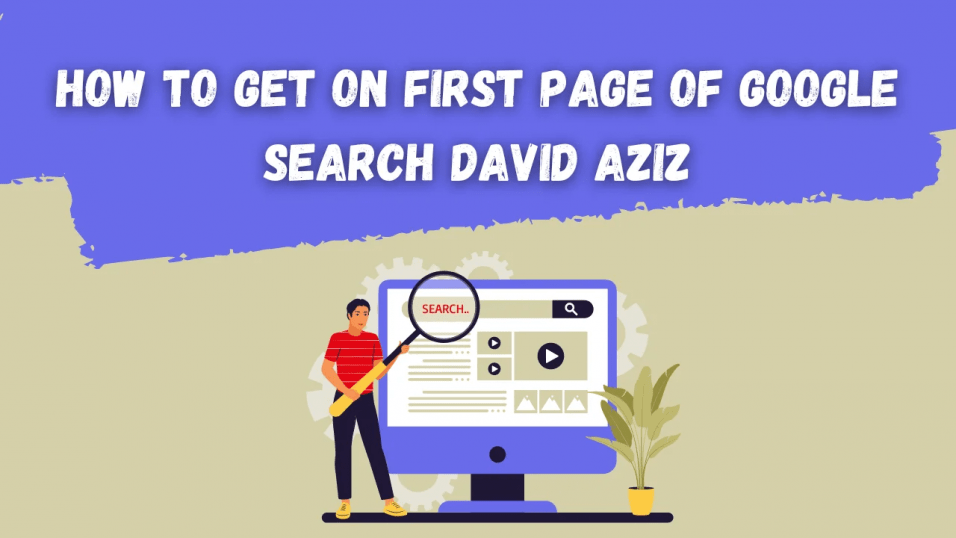
How to rank on first page of google search David Aziz
Every website owner dreams of reaching the first page of Google. With billions of searches every day, ranking high means more traffic, visibility, and success for your business. One name that frequently comes up in SEO circles is David Aziz.
Known for his expertise in digital marketing and search engine optimization (SEO), David has helped numerous businesses achieve this goal. But what’s the secret to landing that coveted spot on Google’s first page? Let's explore key strategies that David Aziz and other SEO experts emphasize.
Why Google’s First Page Matters

Discover why ranking on Google’s first page
When was the last time you went beyond the first page of Google search results? For most people, the answer is rarely. In fact, statistics show that 75% of users never scroll past the first page. This means if your website isn’t ranking on page one, it might as well be invisible.
Google uses a highly complex algorithm that takes into account hundreds of factors to determine how web pages are ranked.
Understanding these factors is crucial for anyone looking to improve their SEO. However, the algorithm changes frequently, making it essential to stay updated on the latest trends and practices. That's where experts like David Aziz come in.
Key Elements of Ranking on Google’s First Page

Learn the essential factors that influence first-page rankings on Google.
Keyword Research
David Aziz emphasizes that effective SEO starts with proper keyword research. Keywords are the terms users type into the search bar when looking for something. The goal is to understand what your target audience is searching for and incorporate those terms into your website's content.
Long-Tail Keywords: These are more specific keyword phrases that usually have lower search volume but higher conversion rates. For example, instead of targeting a broad term like “shoes,” you could target “best running shoes for women.” Long-tail keywords are easier to rank for, and they attract users who are more likely to convert.
Intent-Based Keywords: Understanding the user’s search intent is crucial. Are they looking for information, a product, or a specific service? By aligning your content with the user’s intent, you increase your chances of ranking high. Tools like Google Keyword Planner, SEMrush, and Ahrefs can help identify valuable keywords related to your niche.
On-Page SEO
Once you have your keywords, it’s time to optimize your website. On-page SEO involves making sure that your content is relevant, well-structured, and easy to read.
Title Tags and Meta Descriptions: These are the first things users see in the search results. A compelling title tag that includes your primary keyword will increase the likelihood of clicks. Similarly, a well-crafted meta description can act as an invitation, encouraging users to visit your site.
URL Structure: Keep your URLs short and include your primary keyword. This helps both users and search engines understand the content of your page.
Internal Linking: Linking to other relevant pages on your website helps Google crawl your site more effectively. It also encourages users to spend more time exploring your content.
Image Optimization: Don’t forget to optimize your images by using descriptive file names and alt text. This not only improves accessibility but also helps your content appear in image search results.
Read more: Technical SEO vs On-Page SEO: Key Differences Explained
High-Quality Content
David Aziz consistently emphasizes the importance of high-quality, relevant content. Google’s algorithm prioritizes content that provides value to users.
Content Length: While there’s no magic number for word count, longer content tends to perform better. Posts between 1,500 to 2,500 words often rank higher because they provide more in-depth information. However, quality matters more than quantity. Your content should answer the user’s query thoroughly and effectively.
Answering Search Intent: If a user is looking for “how to bake a cake,” your content should provide a step-by-step guide. If they're looking for “best running shoes,” your content should include reviews or comparisons. Understanding and catering to search intent is key to creating content that ranks.
User Engagement: Content that engages users — through comments, shares, or time spent on the page — signals to Google that it’s valuable. Consider adding videos, infographics, or interactive elements to keep users engaged.
Mobile Optimization
With mobile devices accounting for over 50% of global web traffic, having a mobile-friendly site is no longer optional. Google’s mobile-first indexing means that it primarily uses the mobile version of your website for ranking and indexing.
Responsive Design: Ensure that your site works well on all devices, from desktops to smartphones. A responsive design adapts to different screen sizes, providing a seamless user experience.
Fast Load Times: Slow websites frustrate users and increase bounce rates. Use tools like Google PageSpeed Insights to check your site’s performance and make improvements. Compress images, reduce server response times, and consider using a content delivery network (CDN) to boost speed.
Backlinks
Backlinks, or links from other websites to yours, are one of the most powerful ranking factors. Google views backlinks as a vote of confidence in your content’s quality.
Guest Blogging: David Aziz recommends guest blogging on reputable sites within your industry. This not only provides backlinks but also exposes your brand to a wider audience.
Earned Media: High-quality content is more likely to attract natural backlinks. Reach out to influencers, bloggers, and journalists in your niche to promote your content and encourage them to link back to your site.
Broken Link Building: This strategy involves finding broken links on other websites and suggesting your content as a replacement. It’s a win-win: the site owner fixes their broken link, and you get a backlink.
Read more: Ahrefs' Backlink Checker - Best Backlink Checker Tools?
User Experience (UX)
Google rewards websites that offer a great user experience. If users enjoy browsing your site, they’ll stay longer, which sends positive signals to Google.
Navigation: Make sure your website is easy to navigate. Clear menus, a search bar, and intuitive design improve user experience and help Google index your pages.
Readability: Break up your content into short paragraphs, use bullet points, and include headings and subheadings to make it easier to read. The easier it is for users to consume your content, the longer they’ll stay on your site.
Bounce Rate: If users click on your site and quickly leave (bounce), it’s a signal that your content isn’t meeting their needs. A high bounce rate can negatively impact your ranking. Improving page load times, content quality, and navigation can help reduce bounce rates.
Advanced Strategies to Secure a First-Page Ranking

Explore expert tactics to boost your website’s position on Google’s first page.
Schema Markup
Schema markup is a type of structured data that helps search engines understand your content better. Adding schema to your site can help Google display rich snippets, which improve your visibility and click-through rates.
Voice Search Optimization
As voice search grows in popularity, optimizing your content for it is becoming increasingly important. Voice searches tend to be more conversational, so focusing on natural language and long-tail keywords can help.
Local SEO
If your business serves a specific location, local SEO is a must. Optimizing your Google My Business listing, using local keywords, and ensuring your name, address, and phone number (NAP) are consistent across the web can boost your local ranking.
Learn more: Useful supporting local seo tools that many marketing experts recommend
Common SEO Mistakes to Avoid

Avoid these frequent SEO errors that can harm your Google ranking.
Keyword Stuffing: Overloading your content with keywords in an attempt to rank higher will do more harm than good. Google’s algorithm is smart enough to detect unnatural keyword usage, and it may penalize your site.
Ignoring Technical SEO: While content is king, technical SEO is equally important. Broken links, duplicate content, and slow loading times can all hurt your ranking.
Not Updating Old Content: Google values fresh content. Regularly updating your posts with new information and insights can help maintain or improve your ranking over time.
FAQs
How often should I create new content to improve my rankings?
Consistency is key. Aim to publish new content regularly, whether it's weekly or monthly, depending on your resources. Focus on creating high-quality, relevant content rather than just trying to meet a content quota.
What is a bounce rate, and does it affect SEO?
Bounce rate refers to the percentage of visitors who leave your site after viewing only one page. A high bounce rate could signal to Google that your content isn’t meeting user expectations, which can negatively impact your rankings.
How does site speed affect SEO?
Google considers site speed a ranking factor. Slow-loading websites lead to poor user experience, which can result in higher bounce rates. Use tools like Google PageSpeed Insights to test your site’s speed and make necessary improvements.
Does Google penalize duplicate content?
Yes. Google may penalize websites that contain duplicate content, as it sees this as an attempt to manipulate search rankings. Always ensure your content is original and unique.
Can video content help me rank on the first page of Google?
Yes, video content can boost your rankings, especially if it's relevant and engages users. YouTube, which is owned by Google, often shows videos in search results, so optimizing your videos for SEO can lead to better visibility.
Conclusion
Getting on the first page of Google is no easy task, but by following the strategies outlined by experts like David Aziz, it’s possible. From keyword research to mobile optimization, each element plays a crucial role in improving your search rankings. SEO requires patience and ongoing effort, but the results are worth it. By focusing on providing valuable content and a great user experience, you can increase your chances of reaching that coveted spot on Google’s first page.


